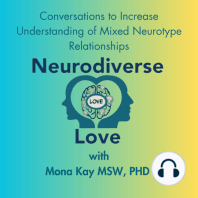63 min listen

The Ups and Downs of a Growth Mindset in a Mixed Neurotype Relationship-Tristan and Renee
The Ups and Downs of a Growth Mindset in a Mixed Neurotype Relationship-Tristan and Renee
ratings:
Length:
69 minutes
Released:
Mar 5, 2024
Format:
Podcast episode
Description
If you would like to join the "mixed neurotype" support group that I co-facilitate with Jodi Carlton called "Navigating Decisions and Choices in Your Neurodiverse Relationship" you can register at: https://jodicarlton.com/groups/
The cost is ONLY $25 per session and we offer 2 groups (12:30-2PM EST and 6:30-8pm EST) and they both meet on Zoom on the 1st Wednesday of each month.
In addition, if you would like to order the digital version of the Neurodiverse Love Conversation Cards ($11) or the Neurodiverse Love Conversation Card Workbook ($12.97) you can click here
Thank you for being part of the Neurodiverse Love community!
_______________________________________________________
During this episode of the podcast, Mona has an opportunity to talk with Tristan and Renee who recently learned that they are a mixed neurotype couple. Tristan identifies as having some traits of what used to be identified as Asperger's and Renee identifies as ADHD. Throughout this conversation, both Tristan and Renee share the struggles and growth they have experienced individually, as a couple and as a neurodiverse family with two young children. Other topics addressed include:
Their different perspectives on their relationship when they first met.
When one partner is clear about the path for the relationship, but hasn't communicated it to the other person: ie: if you're pursuing someone, it's only for marriage.
Codependency and trying to solve other people's problems.
Not understanding when you have poor boundaries.
Supression of emotions and being hypervigilant.
When you have neurodivergent traits, but would not be diagnosed based on the current criteria.
Anger is a sign of fear.
We all deserve to do the things we love and live a life with peace, freedom and a lasting, healthy relationship.
Communicate what you need and how your brain and emotions work.
When your faith helps keep you together.
Agape love can be a transforming force.
Do we actually change or just begin to see things differently?
How are you supporting each other as you each become more of your authentic selves?
The pain needs to pay off somehow and it might be used to help others who are having similar challenges.
What does it look like to love the future version of your partner?
The value of learning and using the Imago Process by Harville Hendrix and Helen Hunt LaKelly
Your partner may feel like they have the solution to every problem.
Choosing to be more assertive.
When people are emotional they may say things they don't mean!
In other cultures they accept people being in crisis and believe they can work through it and get to the other side.
You can crash and burn, but it's not the final destination.
Sometimes we need our partner to do more then just listen and respond appropriately...we need empathy.
The interplay between the masculine and feminine.
To contact Tristan and Renee you can go to: www.purposeadvisory.com.au or send an email to: tristan@purposeadvisory.com.au
---
Send in a voice message: https://podcasters.spotify.com/pod/show/neurodiverse-love/message
Released:
Mar 5, 2024
Format:
Podcast episode
Titles in the series (100)
Alina Kislenko-Changing Therapeutic Models & Creating Paradigm Shifts in Neurodiverse Couples Counseling by Neurodiverse Love with Mona Kay